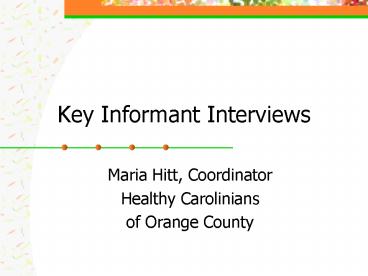Key Informant Interviews - PowerPoint PPT Presentation
1 / 20
Title:
Key Informant Interviews
Description:
... labels to lines of text so that the researcher can group and compare similar ... After coding all your text, look for common topics, issues and statements ... – PowerPoint PPT presentation
Number of Views:89
Avg rating:3.0/5.0
Title: Key Informant Interviews
1
Key Informant Interviews
- Maria Hitt, Coordinator
- Healthy Carolinians
- of Orange County
2
Why Interviews?
- Good way to engage key community leaders in the
CHA - Face-to-face you can build relationships
- May discover issues that you had not anticipated
- Can learn the opinions of leaders
3
Disadvantages
- Time consuming- people are busy
- Analysis is sometimes challenging
- One persons opinion per interview
- Can only do so many, not good if you want lots of
peoples opinions - May be biased
4
Preparing for Interviews
- Develop your list of questions
- Keep it short 15-20 questions
- You should be able to do it in 30-45 minutes or
less - May need one set of questions for agency
personnel and another for community members
5
Preparing for Interviews
- Decide who you will interview
- Agency Directors
- Community Leaders
- Gatekeepers
- Elected officials
- Be sure to represent key populations
- Dont try to do too many
6
Preparing for Interviews
- Practice the interview with others who will be
volunteering or with a friend or colleague - Gather tape recorders, copies of questions,
notepads for note taking - May want to offer a small incentive to
participants
7
Conducting the Interviews
- Introduce your self and try to relax
- Make sure you are both comfortable
- Explain confidentiality, do not use the persons
name in final results - Be prepared to take notes, be sure to write down
good quotes - May want to use a recorder as well
8
Conducting the Interviews
- Look professional
- Break the ice with small talk
- Be natural
- Listen well
- Stay on track
- If yes or no answer- probe for more
- Show respect
9
Wrapping up
- At the end of your interview, ask if there is
anything else they want to share - Invite them to participate in any follow-up
activities like community forums - Thank them and send a note
- Send a copy of final report when ready
10
Analyzing the Results
- Read all the interview notes
- Listen to tapes to fill in any blanks
- Look for themes that run across the interviews
- Are these issues that rose up in other data?
- Did they come out in focus groups as well?
11
Coding data
- The process of attaching labels to lines of text
so that the researcher can group and compare
similar or related pieces of information. - --Ulin et al (2005)
12
Steps in Coding
- Look for repeating themes and issues
- Make a list of the themes
- Analyze those themes in order to find
commonalities, differences, patterns and
structures
13
Coding Terminology
- Domain
- Code
- (subcode)
- Theme
14
Examples of Domains
- Education
- Health Services
- Race Relations
15
Examples of Codes and Sub-codes
- A. Race Relations (Domain)
- A1. Interaction among races (Code)
- A1a. Church (Sub-Code)
- A1b. School
- A2. Racism (Code)
- A3. Issues around Latino immigrants
16
Look for Commonalities
- After coding all your text, look for common
topics, issues and statements - Count the number of times that you see each major
issue - You can color code or use abbreviations or
numbers to code the text
17
Determine your themes
- Once you are able to see the most commonly
repeated ideas you can then determine your themes - Ask your assessment team to review the themes to
make sure you have consensus
18
Example of a theme
- More Whites than African-Americans felt that
there were comfortable social interactions and
stronger community cohesiveness.
19
Be prepared
- Coding and analyzing data is a large task
- Ask for help if you can from local universities
or other groups - Give yourself plenty of time to get this part done
20
Thanks to the UNC-Chapel Hill School of Public
Health Dept. of Health Education and Health
Behavior
- Maria Hitt
- Healthy Carolinians Coordinator
- Orange County Health Department
- mhitt_at_co.orange.nc.us

